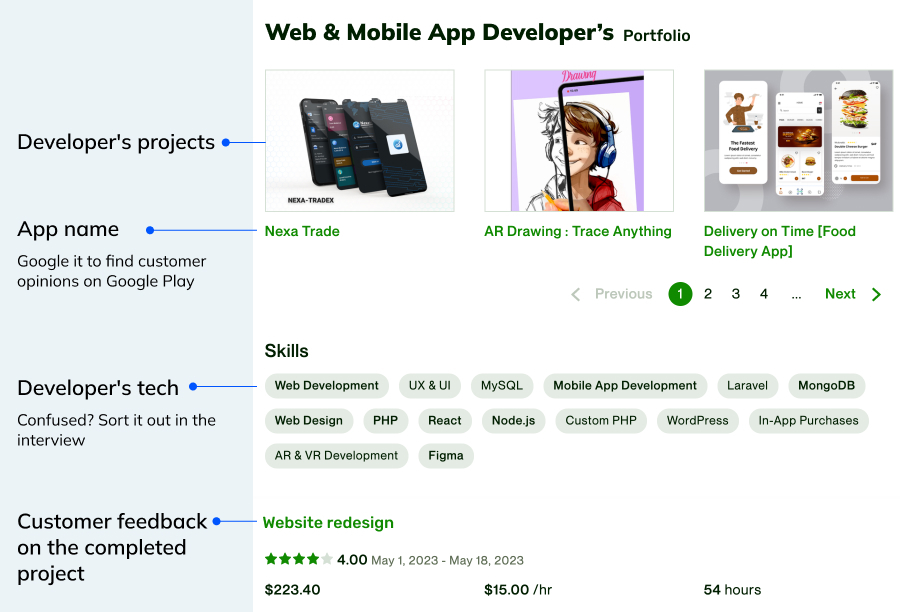Developers Portfolio: Guide for Entrepreneurs
Topic: Guides

October 31, 2023
When called upon as a developer expert to assist in selecting talents for app projects, I frequently observe entrepreneurs struggling with how to make a portfolio assessment for developer candidates. Lacking tech knowledge, they find it tough to judge developers' skills.
In this article, I will address the challenges and pitfalls that might arise. Additionally, I will outline my approach on how to assess a portfolio to aid you in making a reasoned decision.
Issue #1: Maze of Tech Terms
In developers portfolios, you'll probably stumble upon a bunch of tech jargon. One might think, "Can I really assess their skills if I don't understand this stuff?" But guess what?
Knowing tech terms isn't crucial when evaluating a portfolio. They simply flag technologies the developer is skilled in, such as programming languages. You'll likely get into them later.
Focus on the Apps, Not the Tech
For now, just look at the apps in the portfolio. Web or mobile? What business or field? Do the features catch your eye? Will the experience the developer got from this app be a plus for your project?
Make your portfolio picks based on these criteria. Come interview time, you'll be able to directly ask candidates about how their tech fits your project.
When Does Tech Matter in Portfolio Evaluation?
If you've got an existing project and want to grow or change your team, you need to focus on portfolios that mention your app's tech.
If that's the case, though, you likely already know the tech terms, so jargon won't be an issue for portfolio evaluation either.

Issue #2: Portfolio Overstatements
The portfolio in the picture shows projects from various fields, businesses and tech. Does this mean the developer is experienced and savvy in these areas?
The reality is that embellishing the truth is a widespread practice. How do I know? From online portfolios of competitors whose real activities I'm aware of, and from portfolios of developers who come to us for interviews.
Novices Touch Up Their Lack of Experience
Recall crafting your first resume? A developer could fabricate a few projects on current tech trends, Google all the details, or simply let ChatGPT write the whole thing.
Believe it or not, even tech experts might not get suspicious looking at a portfolio written by ChatGPT. They'll catch the deception in an interview, though. But If it's a newbie entrepreneur interviewing, that might not happen.
Competitors Enhance Their Expertise
Even big-name companies aren't above tricks in competitive IT. Yet, their methods are subtler. One tactic is to claim a project, leaving out that they only optimized a little app's portion for a few weeks.
But outright fabrication is also on the table, for instance, with the goal of claiming expertise in an appealing industry they're entirely unfamiliar with.
Are There Ways to Verify?
Did the app mentioned in the portfolio ever actually exist? If so, is the developer the real creator? And do the customer and app users share the portfolio's enthusiasm?
Sorry, but I've got bad news - you can barely verify this. I'll describe three things you can try, but each has its serious limitations.
Find an App on the Web
The portfolio might have a link to a website made by the developer or to a mobile app on the App Store or Google Play. If it's missing, you could try Googling the app's name.
What you get:
You can confirm that such a website or mobile app at least exists, and additionally the following.
For a website:
- Assess the interface's user-friendliness, the ease of navigation, and the loading speed - these are all tied to the developer's abilities.
- Check the website's performance and quality via specialized tools, like Google's PageSpeed Insights - it's also a good indicator of work quality.
For a mobile app:
- Look at user reviews for the app in the App Store or Google Play.
- Install the app to personally gauge its functionality and user experience.
Limitations of this verification method:
- The app may not be accessible online. The app may no longer exist or might be designed for internal company purposes, and therefore not open to the public. Half of my projects are like that.
- App existence doesn't mean the developer was involved in making them. You won't find any info about the creators on the website, in the Google Play, App Store, or in the mobile app - only tech support contacts.
- Assessing the app's usability makes no sense if the developer worked on it a long time ago. Subsequent updates have likely altered it.
Contact an App's Owner
The portfolio might include testimonials from past customers, but they come without contact details. You'll need to either Google the names or request references from the developer.
What you get:
Past customer feedback is highly valuable as direct evidence about:
- How happy the customer is with the app, and how successful it turned out to be.
- How reliable the developer is in fulfilling promises and sticking to timelines.
- How they communicate with customers, manage projects, and beyond.
Limitations of this verification method:
- Contacting past customers often hits a wall: missing contact details, unavailability, or no response.
- This method eats up time and energy. Aligning schedules with busy folks, and waiting for replies is a tall order. Given the range of projects in a portfolio and multiple developers to assess, the workload spirals.
- Subjectivity factor. Can you really trust a testimonial? A customer may give positive feedback for extra perks, or negative due to past disagreements with the developer.
Consult With an Expert
This could be a tech-savvy friend or a professional consultant.
What you get:
- A consultant can help you navigate technical jargon and verify the portfolio's technical accuracy.
- A consultant may speak with the developer to check if they really have experience with the projects and technologies highlighted in the portfolio.
Limitations of this verification method:
- The consultant can't know every programming language or tech out there. If they've never worked with Java or Objective-C, they won't be able to judge the developer's skill in them.
- "Who guards the guardian?" question. How do you know the consultant is trustworthy when they're also a random pick, just like the prospective developer? Who do you believe when opinions clash?
Recommendations on How to Evaluate a Portfolio
So, how do I personally check out my colleagues' and competitors' portfolios? I'll tell you what I look for and why it matters.
How Much Info Does a Portfolio Give?
Whether the project description include the following:
- Distinct aspects of the app. Seeing app specifics in a portfolio, not just generic phrases, proves the developer really knows their stuff.
- The link to the website, App Store, or Google Play. It indicates the developer offers a direct look at their work, instantly enhancing their credibility.
- Summary of the developer's specific role within the project. If it's not stated, should we assume that the portfolio owner completed all these projects solo? In reality, that's not so often.
- Period the developer worked on the project. It's not irrelevant to us whether the project was finalized just yesterday or a decade ago; open disclosure by the developer enhances trust.
Is There Experience in the Relevant Industry?
If the developer has a background in the relevant industry - like online retail or healthcare - it's a real plus. It cuts down the time needed for the entrepreneur to spell out their business specifics.
Yet, as is often the case, there are some "buts" involved:
- Industries are vast, so experience with a medical center project may not translate well to working on a medical device app.
- If you're intentionally searching for developers who have prior experience with a project very similar to yours, it can be quite a demanding endeavor.
- When choosing, experienced developers from diverse fields may be a better option than a novice with industry-specific knowledge, as the novice will still take longer to grasp the project.
- And again, can you trust the developer's claim of having industry-specific experience?
Are There Simple Ways to Obtain More Proof of an Attractive Portfolio?
If an intriguing portfolio has a Google Play or App Store link, you'd click, check user feedback, and test the app.
If the app owner is readily identifiable and accessible, why not send an email? And if you have a respected consultant in your network, it's likely a wise move to seek their advice.
However, when asked whether to routinely verify candidates' portfolio information, I'd advise against it. It's time-consuming and often yields no results.
Can You Be Certain in Your Choice?
Absolutely not.
Even when an experienced engineer hires a developer after extensive interviews and testing, they can make a mistake. You can never know for sure how capable someone is until they prove themselves in action.
Happy hiring!